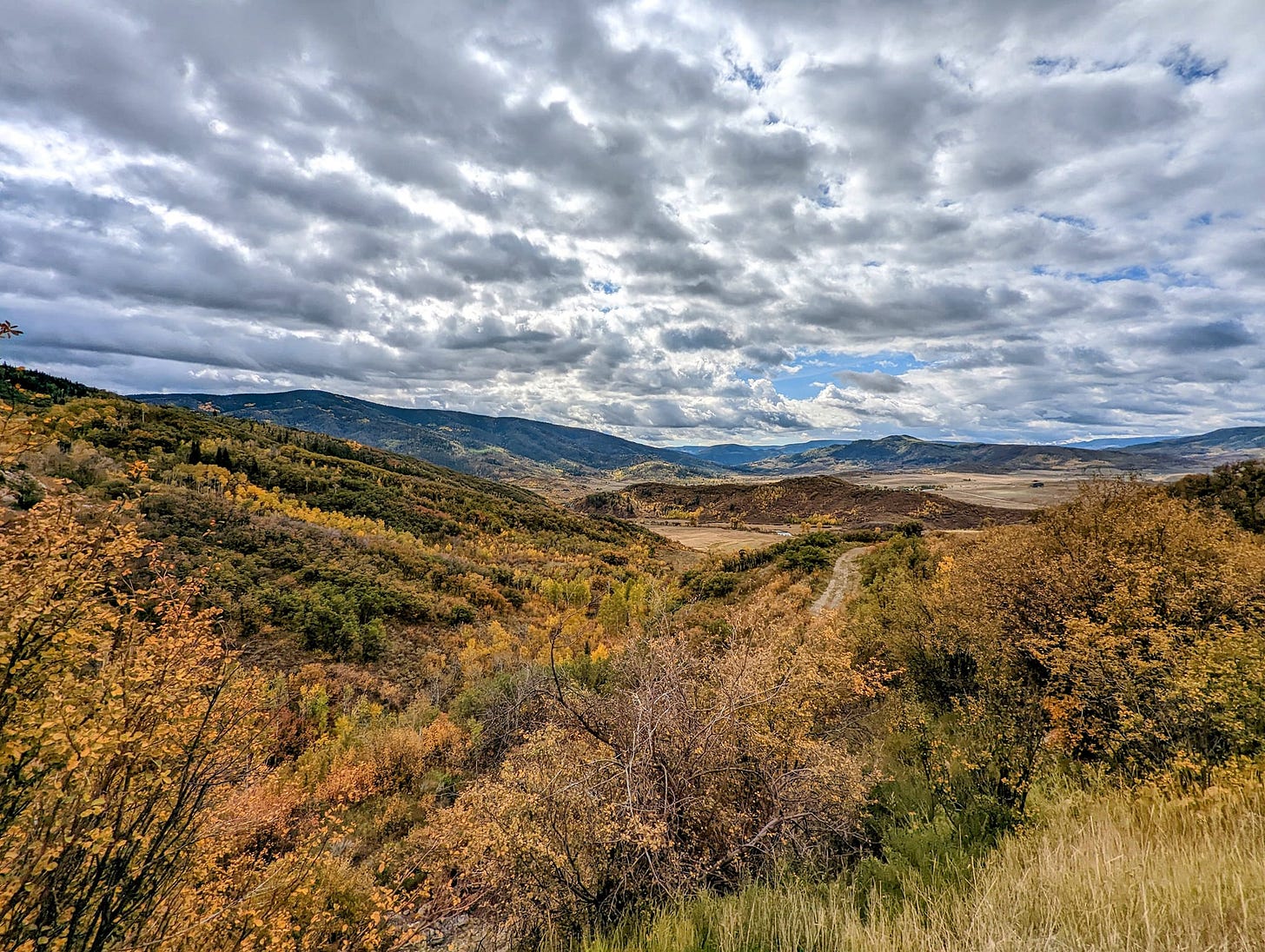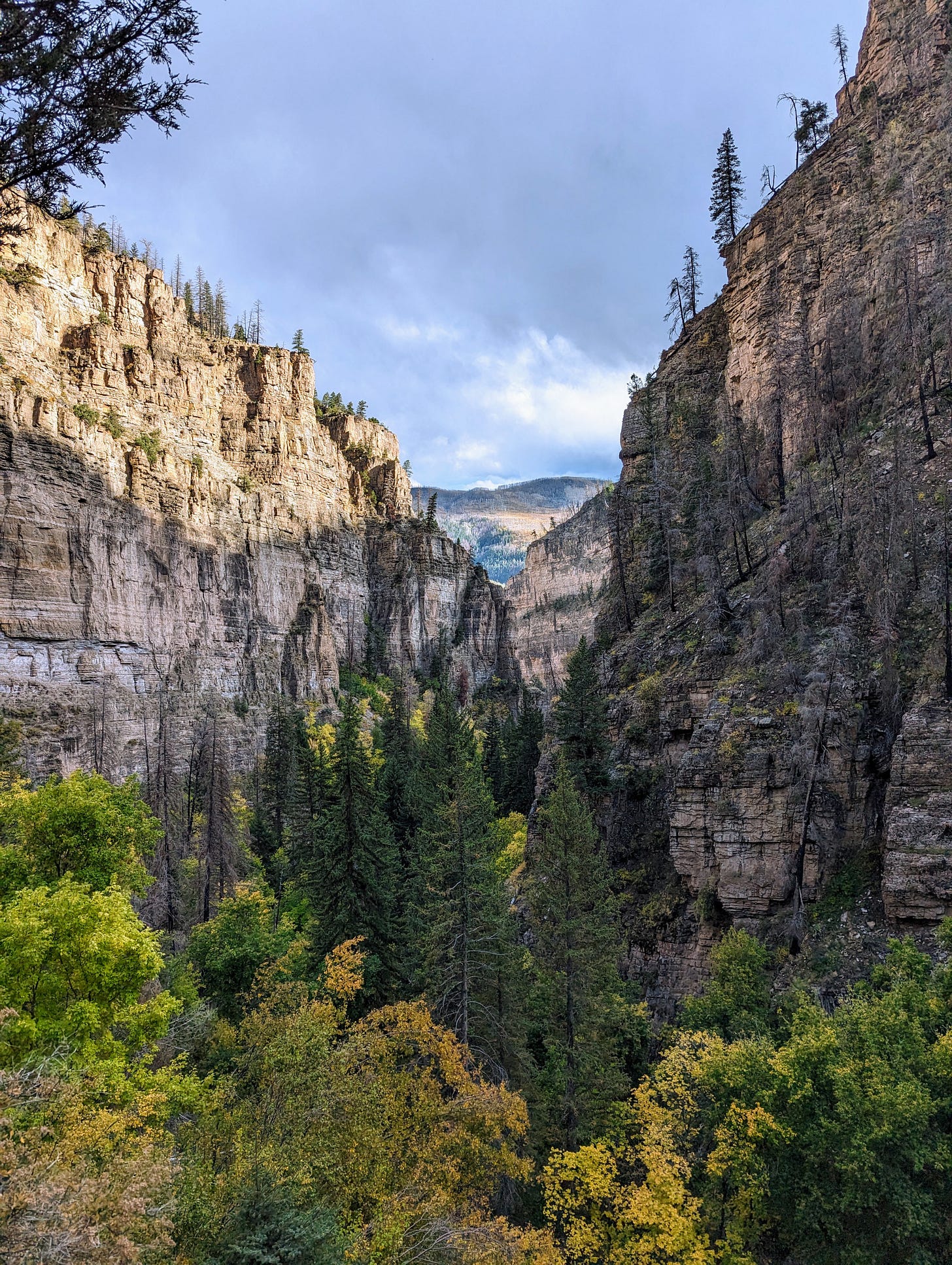Yesterday, on my drive to work, as I turned onto the road leading to the cadet area of the Air Force Academy, something rolled off and fell underneath the passenger seat of my car. I pulled over to the side of the road so that I could park, unbuckle and retrieve the thing. Sitting there for a minute afterwards, I noticed that here was a place I had never once stopped.
Or really paid any attention to at all.
The leaves are changing now in Colorado. The long grass is a soft, desaturated yellow. The mountain range looms close. For a moment, I imagined walking from that mundane pull-off into the adjoining copse of trees, so I could be inside the inviting scene. I had gotten just a small sip of a place and felt the mild urge to immerse in it for a while. But I am supposed to be at my desk by a particular time, and “forest bathing” might not be a well-received explanation for lateness, so off I drove…
(that’s not a picture of the pull-off. It’s just Colorado being violently Autumnal somewhere nearby)
When I was in high school, I would walk to school on most days. This was a journey that took about 20-30 minutes every morning, and I would carry a thermos of coffee with me. I have this memory of often deviating from my intended route, stopping on my way to climb a tree and sit in it for a while, drinking coffee, smoking cigarettes--savoring time and place. It is a fond memory. My grades for that first period of the day (and a perpetual detention balance) reflected the choice I would often make to remain in a tree, savoring tobacco and caffeine and nature, rather than making it to school on time. I had some very clear priorities, and even looking back I am glad for it. Are we supposed to regret such deviance later in life? Is that what growing up means?
I remembered those "stopping and savoring” places as I pulled away from that serene place by the autumn grass and trees under the mountain. I started to think about how detached I am these days from the countless places in-between origin and destination, because of cars and roads and distraction and routine.
Authors like Tyson Yunkaporta and Robin Wall Kimmerer have positively infected my mind with this concept of "place". Yunkaporta, in Sand Talk, defines an indigenous person very specifically based on their relation to place, as "a member of a community retaining memories of life lived sustainably on a land-base, as part of that land base." He shares that in the Wik language, there is no word for "culture", and the closest to it would be a sentence that translates to "being like your place". In Braiding Sweetgrass, Kimmerer offers that
“Paying attention is a form of reciprocity with the living world, receiving the gifts with open eyes and open heart.”
While I can't claim to have ever been indigenous to any place to the degree that Yunkaporta describes, I have before experienced a degree of intense presence and attention within a place. Growing up in the Santa Cruz Mountains in California, I spent my whole childhood surrounded by vast expanses of well-preserved forest and river ecosystems. I spent many thousands of hours alone, immersed within that natural setting, undistracted by the technology that now relentlessly pulls me out of my environment. I would spend time walking, for sometimes 8 to 10 hours in a day, through redwood forests, down train tracks, along and through rivers, occasionally by the ocean, and I would stop regularly and just be in places—infinite particular configurations of plants, water, earth, and sky.
When friends and I started smoking cigarettes in high school, we would often trek into the woods to find a good place to imbibe. Part of what we were looking for was, of course, hiding from the watchful eyes of those who disapprove of smoking teens and might rat us out to our parents. Another significant part was aesthetic and atmospheric in nature. We sought out a good place to sit and dwell for a time. Smoking, while of course a terribly toxic and self-harming habit, has these aspects to it that have always struck me as oddly grounding. It is often an act of slow, meditative savoring. It can be meditative and focusing. And at least the way I often did it, there was this focused presence to the act—6 minutes or maybe hours sitting or standing in one place, attending to the environment and whatever company might be present. Smoking, in my experience can be understood as a tool for reflection and a “social technology”. (this is not an endorsement of smoking, lol)
I’ve been thinking about presence and place and what might be called attending (in Middle English meaning “to apply ones mind or energies to”) a lot recently, inspired by books like Johann Hari’s Stolen Focus and Jenny Odell’s How to Do Nothing, which both explore the effects of technology and the attention economy on these facets of our existence. Another recent read, Andrea Wulf’s Magnificent Rebels, focuses on a group of the earliest Romantics in the German town of Jena, whose philosophical, scientific, and artistic pursuits revolutionized the Western relationship with both the natural world and social structures/institutions. It got me reflecting once again on questions of just how much I actually occupy and attend to the places in which I exist:
“The young Romantics began to feel a deep sense of connection to the world around them. They wanted to see the world through the lens of their own selves. Instead of just visiting museums and cities, this new generation scrambled into caves, slept in forests and hiked up mountains to be in nature. They wanted to feel rather than observe what they were seeing. They wanted to discover themselves in nature and ‘to be one with everything living’”
A few months ago, I discussed with Austin Wiggins their development of the concepts for “Sociotechnological Imagination/Vision”. We arrived eventually at a description of technology as often favoring destinations over journeys. A good deal of technological advancement can be framed purely through this lens, as having eliminated or shortened a particular journey to make the destination more accessible and the journey easier. As a writer, I have explored a bit the idea that generative AI like ChatGPT eliminates the journey of reflection and composition and brings the destination of composed, coherent, at least relatively referenced text mighty close—like how internet encyclopedias and smartphones brought knowledge about any subject impossibly close, instantly accessible, eliminating the previously necessary, slow journeys of search, access, research, education, synthesis, recall, etc. Now I can speak any question about a historical fact into my phone—the shortest and most casual of journeys—and before I’ve had time to wonder whether all education will someday seem pointless, the answer has arrived.
One pair of questions Austin and I came up with to spark reflective practice in how we engage with technology was the following:
“Does the technology shorten or eliminate any journey or process? And was there any benefit in engaging with that process or journey that is now being lost?”
Internally, these ideas collided at some point with the concepts of place and presence which I’ve now been stewing on for a few years. I started to think of roads—a technology to shorten and ease the journey from place to place—as thoroughly detaching us from the places that we might otherwise occupy in between origin and destination. Places like that spot where I momentarily stopped on the side of the road yesterday next to the trees and the Autumn grass under the mountain. A place I had passed through hundreds of times and somehow never been. Not until I pulled over there yesterday and realized that it, too, is a place worth being.
In the last two weeks, I have twice gone with my family on the epic hike up to Hanging Lake near Glenwood springs, Colorado (pictured). The views here are stunning, thoroughly isolated from most human interference or distraction, and it is impossible to avoid awareness of the beauty of this ecology when you're so deeply immersed. Traversing steep paths along a rushing creek, between majestic cliffs, stepping short-breathed through fall foliage... I'm a big fan of our national parks system, setting aside lands for the particular purpose of preservation, making them available to us who make pilgrimages to go and appreciate. But then I can't help but wonder what effect a “destination orientation” has on our ability to appreciate the places that we occupy the rest of the time. Life is like 99% journeys and 1% destinations. Just about everyone who has “arrived” where you’re headed just immediately started another journey.
It’s a little funny that we go to designated destinations in order to start being somewhere, when a simple deviation from the deep grooves of our routine paths, a stop by the side of the road, is enough to awaken curious attention. Where have you actually been recently? And did you go on a long journey to get there, or could it have been as simple as a brief, deviant departure and a moment of intentional pause?





Everyone! Dan said we can smoke!! Kidding aside, it’s a good insight about technology favoring destination, stripping/optimizing the magic out of a journey. Too much Mcgilchrist left hemisphere!